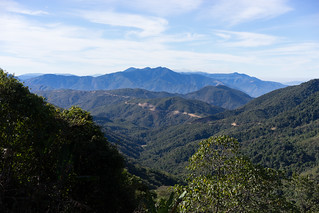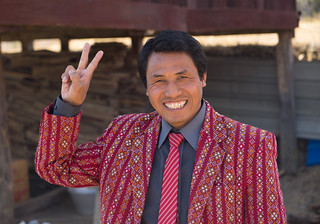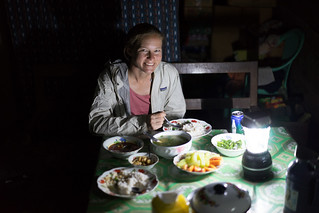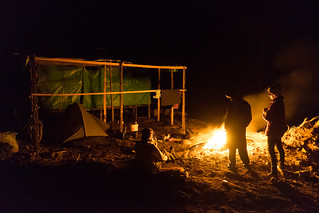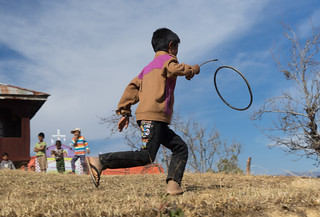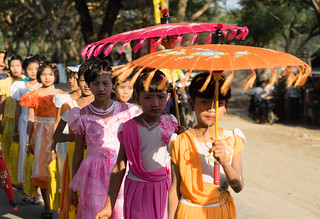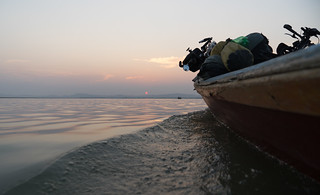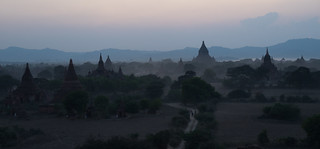We left Hakha around sunrise to get an early start to what would end up being nine days without a shower, bed, or internet, and a diet that consisted primarily of ramen noodles. Shortly after Hakha, the beautiful pavement ended and we spent the rest of the week on dirt. We found few proper restaurants on this stretch, but on our first day we found a nice place called ‘Heaven Cafe’ in the village of Satka. The woman running it spoke some English and went off on her motorbike to get eggs when we asked to have some in our noodles, which was the only thing they sold other than coffee. Like all of the Chin villages we encountered, Satka was strung out along the road, which was following a ridge, so we enjoyed the view and the ambience of the little roadside cafe, where we were the only customers. We camped for several nights in a row, sometimes with beautiful views into the valleys below, and sometimes hidden in thick secondary forest. One night we were close to a stretch of road construction, and the bulldozers seemed to go all night. By this time, we no longer had a full moon so we had to use our headlamps, but we were careful not to shine them towards the road and went undetected every night.
One day, we were invited to stay in a village celebrating its Golden Jubilee, or 50-year anniversary. We had stopped to find lunch, and as there was no restaurant we were taken to the pastor’s house and fed there. A young woman who worked at the church happened to speak English and played tour guide. She explained what was happening for the Jubilee and invited us to attend the celebration and spend the night. She also took us to a funeral service for a young woman who had died the night before. We were still in our bike clothes and she marched us right up and into the house where the woman had been laid out in a tiny room, all her relatives around her. I felt so out of place and inadvertently disrespectful until the first person reached out to shake my hand. Then the next, and the next, and I found myself kneeling on the wooden floor, having just caught my first glimpse close-up of a dead person, a total stranger who had died after a long illness, leaving her 3-year-old daughter behind, while her loved ones welcomed us. I shook every hand that came toward me, hoping something in my posture, my murmured attempt at ‘hello’ in the local dialect of the Chin language, would show them my sympathy, my condolences.
Later our friend took us to the big tent where the Jubilee events were set to happen later that day, but we had barely come in when she and another young man told us we’d have to go – the headman of the village was worried that police might come out to the Jubilee from the closest town, Rezua, and that he might get in trouble if we were found there. They could call and ask, she said, and there was a chance they might say yes, but the village authorities were afraid. That was enough for us, and soon we were on our way, although we were sad to miss the celebration. When we got to Rezua we stopped to buy the basics, but nobody wanted to sell us anything. Instead, they wanted to give us things. We managed to pay for some eggs and condensed milk, but the rice and rum we hoped to buy were given to us by smiling women more excited to greet foreigners than to make a buck.
We were prepared to camp, but again it was very hilly, with every flat space occupied by a village. We asked a couple outside of their house for water, and then we asked if there was anywhere we could sleep. They smiled and gestured up the hill, and we rode on, uncertain of what they’d meant. When we got to the top of the hill, we found ourselves in the main village, and an old woman greeted us as if she’d been waiting for us. I joked that the couple must have called ahead, but there was no cell reception there. The woman led us to the house of a young woman who spoke English, who then brought us to a large house where an older couple lived. We would stay there, she said, and also pointed to a cistern out back, indicating that we should wash up. After so many days on a dirt road, she had a point. We cleaned up as best we could while remaining fully clothed, and also washed our bike clothes as we were now down to one outfit each. We made our ramen, then hung out briefly with the couple. They made no effort to communicate, but our beds were laid out in their living room so perhaps they were just going about their normal routine. We shared some chocolate and looked at family pictures, and then everybody went to bed.
The next night we stayed in another village just past Matupi, one of the larger towns in the area. Although there were police in this town, and a military camp nearby, Chin State overall felt so remote that I had lost my fear of the police, as long as we weren’t in big towns that had police stations. The headman of the village waved us down as we went through his village near sunset. Again, it was like they were waiting for us. He invited us to stay in another family’s house where we were served dinner. They ate after us, which made us sad as we would have liked to eat with them. (It also would have given us a better idea of how much food they had, so we wouldn’t overeat and inadvertently leave them with too little, which was something we worried about.) However, we weren’t lonely – the headman and two teachers, all of whom spoke fairly decent English, talked with us all evening. The headman told us his brother was a refugee living in New York – apparently he had angered the soldiers from a nearby military camp for protesting their destruction of a cross, and had to leave.
Before leaving us for the night, the headman brought out a big register book and asked us to write down our names and the date. He told us he would let the authorities in Matupi know that we had stayed there, and suddenly I was afraid again. “Are you sure that’s OK?” we asked. We had heard that local people often don’t know the rules related to foreigners, and we were worried he and the family who hosted us would get in trouble. We also preferred to stay off the authorities’ radar, just in case we weren’t supposed to be there. He said it was fine, though, and we didn’t really have other options. So we registered ourselves and hoped everything would be fine. With respect to the authorities in Chin State, everything was fine; with respect to my belly… not so much. I woke up in the middle of the night feeling feverish and sick to my stomach, and only felt slightly better in the morning. Fortunately the family had one of the nicest outhouses I’d seen in Myanmar, and with the help of some Cipro we were on our way.
We camped the next night with a few construction workers, and the following night we found a beautiful spot just past a small village where we’d stopped to refill our water bladder, fuel bottle, and flask. The woman running the ‘store’ didn’t seem to have a firm grasp of mathematics or business, so I tallied up the bill after coaxing the price of each item from her. David spent that stop trying his hand at the stick-and-wheel game that I believe was popular in the US in our grandparents’ generation, and is still ubiquitous in developing countries. It’s harder than it looks, but he provided great entertainment. We enjoyed more beautiful views on what turned out to be our last night camped up high.
The following day we passed through the large town of Mindat and saw our first tourist since Hakha. We also saw women with tattooed faces, an old practice – perhaps to identify them as members of the Chin tribe in case of kidnapping by other tribes – that seems to be dying out, as only older women had the tattoos. The night before we had climbed up to the highest point of our route through Myanmar, 2700 meters, and now we were on our way down. Unfortunately it was now David’s turn to feel sick and he couldn’t really enjoy the looping, paved descent. We cycled out of Chin State and soon started seeing Buddhist stupas again instead of churches. We stopped in a valley village to get water and camped off the road not far from some sort of temple blasting wailing tinky-tonky chanting music until past our bedtime, then starting up again before sunrise.
The next day we biked to Myit Chay, across the Irrawaddy River from Bagan, an area full of ancient temples and one of Myanmar’s most popular tourist destinations. A bridge crosses the river a bit to the east of Bagan, but crossing it would have added over 20 kilometers to an already long day. Plus, Bangladesh had taught us that where there are towns on two sides of a river, there is usually a boat. We started asking around, and sure enough we were told that we could get a boat in Myit Chay. When we got to the town, we asked some friendly men where we could find a boat, and they said to turn left, go for one or two miles, then turn right again and go for another one or two miles. Simple enough, we thought.
On our way to the river, we encountered a group of people wearing Bogyoke (“General”) Aung San shirts, and a big truck all bedecked with posters. General Aung San is considered to be the father of modern, independent Burma, and is well-loved by most of the population. Internationally, he is perhaps better known as the father of Aung San Suu Kyi, the face of Myanmar’s democratic movement who was famously kept under house arrest by the military junta that ruled Myanmar from the 1960s until very recently. It turned out that the following day would have been General Aung San’s 100th birthday, and his hometown was nearby so they were preparing for a big celebration.
Next, we came across a parade of little girls on dressed up horses, young women carrying platters of fruit, and men driving oxcarts festooned with flowers. It was a procession to a Buddhist site – we’re not sure exactly what for, but we were the only foreigners – and the only spectators – so people stopped and posed for photos and waved and smiled. It was a couple of hours before sunset and the light was just right – I felt like we had stumbled onto our own private parade, done solely for the participants and just happening to have an audience of two, us.
After a mile or so, we asked a street vendor how to get to the river. The man gestured vaguely onward so we proceeded, but within a few minutes a man rode up to us on his motorbike and indicated that he would show us the way. Thank goodness for him, or we never would have found the river. For about 20 minutes we wound down tiny dirt paths through fields where women were harvesting crops, waving at us as we rode by. Eventually he turned off and pointed us to the last bit towards the river. We’d thought he happened to be going that way, or had a boat, but no, he was just taking time out of his day to show two strangers the way. We thanked him and continued on, and soon found ourselves at the shore of the Irrawaddy River.
A group of intoxicated young men were sprawled around a volleyball net, and when we asked about a boat they enthusiastically indicated that yes, they could take us. Nyaung-U, the main town near the temples, was directly across the river, and they offered to take us there for 5,000 kyat (~$5). But we wanted to go to Old Bagan – the main temple area, and a bit farther downstream – so we could see the temples from the water at sunset, and this seemed to confuse them tremendously in their drunken state. I thought it was a language thing, but soon a man arrived on a motorbike who spoke good English. He translated, and it seemed that they understood, but would charge 15,000 kyat to go all the way to Old Bagan. No problem, we said, let’s go. But then they put us on the boat going to Nyaung-U. Confusion reigned, and we weren’t sure we wanted one of these wasted men to pilot us and our bikes across the river. Then another boat arrived, and the boatman seemed sober.
He seemed to understand our request, so we pulled our bikes out of the first boat and walked to his. All seemed to be going well until one of the drunk men, who we nicknamed ‘White Skull’ for the logo on his t-shirt, hopped in. No, we said, we want to go with the other man, the one who is sober. So sober guy hopped in, and nodded solemnly when we indicated that he was to drive. White Skull fired up the engine, and again we pointed to sober man. Again he nodded, and moved towards the back of the boat, but when I looked back, White Skull was driving, grinning away. We figured he couldn’t do too much damage, and if he started to steer us astray we’d have sober guy take over. White Skull got us safely to shore, and we got our first glimpse of the temples as the sun set over the river. Then we biked to Nyaung-U – where we actually planned to stay – and found a nice hotel, one of the most expensive of the trip, but we didn’t care. Unbeknownst to us, another bout of GI problems was settling in, and we needed to rest.
Bagan was an interesting place, but due to being sick and exhausted from our crazy ride through Chin State, we spent most of our time there relaxing at the hotel. We got out to see the temples a few times, always on our bikes, and we joined all the other tourists for sunset at Shwesandaw Pagoda. Bagan is probably the most visited place in Myanmar, and we certainly saw more foreigners there than anywhere else in the country, but somehow it didn’t feel overrun. There were still monks strolling around, and local people seemed happy to talk to us. There was western food, which we appreciated with our weakened stomachs, and decent ice cream if you looked hard enough, and people hawking art and trinkets at the major temples. Still, Nyaung-U felt like a sleepy town that just happened to have a thousand or so temples scattered around it. There was an entrance fee of $20 for the whole site, but they only checked tickets at the major temples. At smaller ones we were usually the only tourists there, and gatekeepers would let us in to roam around while kids played soccer outside. We stayed one night longer than intended, waiting for our stomachs to recover, then rode out of Bagan, aiming for the coast.







